2025 U.S. National Championships
Wichita, KS
20 - 26 January 2025
Malinin Scores Triumphant Third Consecutive U.S. Title
by Liz Leamy
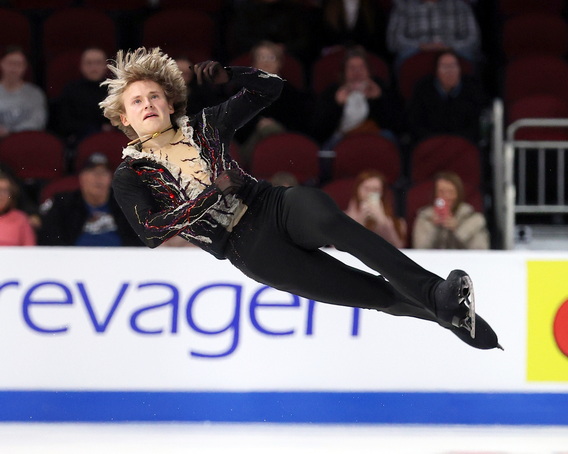
Ilia Malinin, the 2024 World champion, 2023
World bronze medalist, ISU Grand Prix Final victor in 2023-24
and 2024-25, two-time U.S. titlist in 2023 and 2024 and 2022
U.S. silver medalist, laid down the proverbial golden hammer in
characteristic style as he triumphantly claimed his third
consecutive U.S. title at the U.S. Championships this week.
Malinin, who was also a resolute first in
the short program at this event, locked in the gold medal in an
extraordinary free skate in which he reeled off six quads with
quickness, command and ease, along with superb spins, exciting
footwork and a huge back flip, among other notable things, for
which he earned a whopping 331.31 total, numbers that catapulted
him ahead of the rest of the competition by nearly 45 points.
(44.82 to be exact)
Skating to ‘I’m Not a Vampire’ by Falling
in Reverse, Malinin earned a 219.23 for his dazzling
performance, receiving a 128.18 technical element score and
92.05 component score.
“I felt that it was definitely a pretty
good performance and I think I have definitely improved a lot
since the Grand Prix Final,” said Malinin, who trains with his
parents, Tatiana Malinina and Roman Skorniakov, both of whom
were Olympic singles contenders, in Reston, Virginia, as well as
with Raphael Arutyunyan. “I’m definitely happy with all the
progress I’ve made at this competition, but now I can use that
time to take everything that I’ve learned from my performances
and really try to develop them and get it as perfect as I can
before Worlds.”
Andrew Torgashev, the 2023 U.S. bronze
medalist who trains in Irvine, California with Raphael
Arutyunyan, claimed silver in stellar fashion, maintaining his
second-place standing in the short with an adrenalized free
skate to ‘Scheherazade’ by Nikolai Rimsky-Korsakov for which he
was awarded a 191.55 and 286.49 total.
In this high-powered program, Torgashev
reeled off a quad toe, quad toe-double toe, triple loop, triple
Axel, triple Axel-double Axel sequence, triple Lutz-1/2
loop-triple Salchow and triple flip with power, height and
ownership, skills and efforts which also generated a huge
standing ovation from the super-enthusiastic Wichita crowd.
“It’s validating whenever you’re on the
podium and it makes it seem like your hard work has been worth
it,” said Torgashev. “It can inspire confidence and definitely
gives motivation to keep training and keep pushing on.”
Camden Pulliken, the 2024 U.S. bronze
medalist who was fourth in the short, claimed the bronze medal
with his stellar free skate to ‘Outro’ and ‘Solitude’ by M83 for
which he was awarded a 164.16 and 252.92 total.
Pulliken, who also placed fourth in the
free skate at this event, executed a triple Lutz-double toe,
triple Axel-1/2 loop-3 Salchow, triple loop, triple Axel, triple
Lutz-double Axel sequence and triple flip as well as solid spins
and compelling footwork.
“I think that sitting on the podium for the
second time is super validating. I was happy to be here in
Wichita and it was a great city that has hosted us,” said
Pulliken, who trains in New York City with Alexander Johnson
where he also works as a full-time finance industry
professional. “So it was a great time being here.”
Efimova and Mitrofanov Capture U.S. Pairs Crown
by Liz Leamy
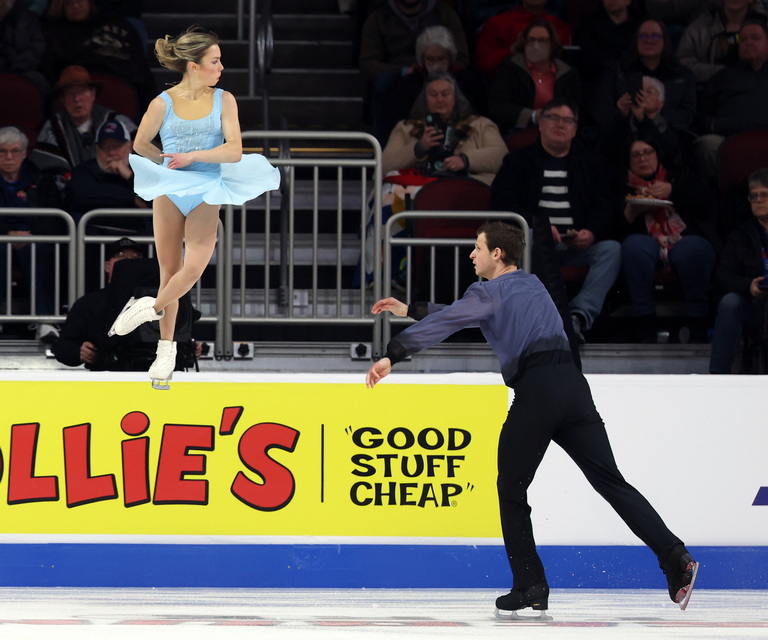
Alisa Efimova & Misha Mitrofanov, the
2024 U.S. silver medalists who work with Olga Ganicheva and
Alexei Letov at the Skating Club of Boston in Norwood, clinched
the U.S. title in remarkable style in the pairs free skate event
held in Wichita this past Saturday with a superb free skate
program to Serge Lama’s ‘Je Suis Malade’ for which they earned a
142.87 for a 211.90 total.
This memorable performance, which resulted
in Efimova & Mitrofanov catapulting right to the top final
position after having finished third in the short program, was
defined by power, skill, artistry and drama.
The two, who have only been skating
together since 2023, reeled off a soaring split triple twist,
side-by-side triple toes, a huge throw triple loop and throw
triple Salchow, high-powered lifts and an interesting left
forward outside death spiral, among other notable things, with
great strength, command and ease.
“This is our second Nationals and I am very
proud of us that we made it on top of the podium,” said Efimova.
“It’s my dream right now for our [whole] team and community. I
really wanted to do it for them because they do so much for us,
our coaches, our parents, our skating club and everyone. I’m
just really happy it turned out this way and I want to say thank
you to them.”
Mitrofanov further elaborated.
“It was always a dream of mine to be able
to stand on a podium and so today it’s very surreal. That’s the
best way to put it right now,” said Mitrofanov. “I definitely
want to thank my coaches, the club and our family. It wasn’t
just us winning tonight, there was a whole community. For us
right now it’s that we didn’t just win, but also the community.”
Katie McBeath
& Daniil Parkman, another
relatively new pair team who had only joined forces back in
2023, were another golden story to emerge out of this event with
their impressive jump from fourth place in the short to second
overall with their stellar free skate for which they were
awarded a 127.65 and 190.57 total.
This powerful team, who trains with Jenni
Meno-Sand, Todd Sand, Brandon Frazier and Christine Binder at
Great Park Ice & Five Point Arena in Irvine, California, earned
the event’s second-highest marks for their performance to Josh
Groban’s ‘Per Te’ that was defined by an extensive array of
top-grade elements as well as engaging artistry.
In their program, the duo reeled off a huge
split triple twist, a rock-solid triple toe-double Axel-double
Axel sequence, huge throw triple loop, incredible fluid lifts
and an innovative choreographic sequence, among other things,
with all the called elements being marked at the optimal level
four.
“It’s feels absolutely amazing,” said
McBeath. “It has been a dream to be on a National podium and it
came true today, so I’m very happy about that.”
Parkman agreed.
“It feels kind of unexplainable because
some things were tough in the season, but with the support of
our coaches, clubs, Great Park Ice & Five Point Arena and each
other’s support, we are here. Thank you. Thank you very much
everybody.”
Ellie Kam & Danny O’Shea, the 2024 U.S.
gold medalists, 2023 U.S. bronze medalists and 2024-2025 ISU
Grand Prix finalists who lead the 12-entry competitive roster in
the short, wound up with the bronze medal in the final standings
for their valiant and courageous free skate to ‘Stand By Me’ by
Ben E. King as performed by Florence and the Machine and
‘Concealed Passion’ by Audiomachine for which they earned a
112.38 and 189.57 total.
While their program featured an array of
showstopping lifts, dramatic death spiral and outstanding
combination spin, there were some glitches, including a missed a
throw triple loop, throw triple Lutz and triple jump sequence
and tumble as they finished their final lift.
Still, it was still more than clear that
Kam and O’Shea, who train with Drew Meekins, Bruno Marcotte and
Sandy Straub in Colorado Springs, were all about a top standard
in regard to their rock-solid skating foundation, technique and
general execution and alignment, something that transmitted
powerfully among to the Wichita InTrust Bank Arena crowd, who
cheered for them loudly throughout their entire program.
“Even though we didn’t have the best
performance that we wanted to tonight, we are definitely still
so blessed to be up on a podium with these amazing athletes we
got to compete with,” said Kam. “They’re all so amazing.”
O’Shea concurred.
“We fought really hard tonight, but you
know we’re going to use it as motivation,” said O’Shea. “To see
the state of U.S. pairs continue to grow and push forward by
amazing athletes, we consider ourselves very blessed to be on
the podium.”
Like Efimova & Mitrofanov and McBeath
& Parkman, Kam & O’Shea have only been together for a relatively
short period of time, as their first season competing together
was back in 2022.
Chock and Bates Score Sixth U.S. Title With
Stunning Jazz-Themed Free Dance
by Liz Leamy
Madison Chock
& Evan Bates, the
powerhouse American dance duo who are the 2023 and 2024 World
champions and five-time U.S. titlists, reigned supreme in the
dance event at the U.S. Championships in Wichita on Saturday,
claiming their sixth U.S. title with a 223.52 total,
outdistancing the remainder of the 15-team roster by more than
13 points.
Notably, Chock & Bates were awarded a
131.36 for their compelling interpretation of the iconic jazz
classic ‘Take Five’ by Dave Brubeck in which they executed their
elements with command, flow and expertise.
The duo, who train in Montreal with Marie
France-Dubreuil, Patrice Lauzon and Romain Haguenauer, were
awarded high grade of execution marks for such elements as their
stunning rotational lift, choreographed twizzles and intricate
footwork sequences, among other things.
For Chock
& Bates, skating at the U.S
Championships is always an experience that means a great deal to
them.
“It honestly means the world to us. The
U.S. Championships are always an event that we grew up coming to
every January and watching every year on television as kids,”
said Bates. “It’s really what made us fall in love with the
sport. There’s something incredibly magical about this event and
we hold it in very high regard.”
Christina Carreira & Anthony Ponomarenko,
the 2024 U.S. silver medalists and 2023 U.S. bronze medalists,
clinched their second consecutive U.S. silver medal in this
discipline for their engaging free dance to ‘Carmen’ for which
they earned a 127.93 and 210.79 total.
Covering the ice with tremendous command,
posture and grace, Carreira and Ponomarenko reeled off a
stunning straight-line lift, beautifully extended twizzles, an
artful rotational lift and high-tech step sequences featuring
well-executed turns and steps, among other things.
Donned in dramatic red and black costumes,
Carreira and Ponomarenko told the fascinating, yet tragic story
of Carmen with their skating, efforts that resonated big with
the audience, something that also meant a great deal to both of
them.
“It’s a really special event and it’s
always fun to skate at home,” said Ponomarenko. “This dance
field is so strong and we’re really proud to be on the podium
and to be part of the competition.”
The two also elaborated on their intensive
work in regard developing to their Carmen program.
“We had a huge training block of six to
seven weeks where we did a lot of enhancements and really worked
on the potential we believe it has,” said Ponomarenko, who,
along with Carreira, train in London, Ontario with Scott Moir
and Madison Hubbell. “So we’re still working in the right
direction and I think we took a huge step today. We just have to
keep working hard filling in the little nuances and skating to
the best of our ability.”
Rachel Green & Michael Parsons, the 2022
Four Continents champions and four-time U.S. medalists, clinched
bronze in this event, scoring a 123.24 in the free dance for a
205.37 total.
This powerhouse team, who train in Canton,
Michigan with Charlie White, Tanith White and Greg Zuerlein,
racked up high scores, stepped up from fourth in the Rhythm
Dance to third due to their memorable performance to ‘Spiegel im
Spiegel’ by Arvo Part as performed by Angele Dubeau and La Pieta
and ‘Dance Me to the End of Love’ by Douglas Dare.
Their outcome at this main event
represented a significant step for this team, to say the least,
who had finished fourth at the 2024 NHK Trophy and sixth at the
2024 Cup of China last fall.
“This National Championship is the
culmination of a huge amount of work that Caroline and I and our
entire team have put in,” said Parsons. “This is just
confirmation that the work that we put in and the dedication
that we have to ourselves and to each other is paying off. We
couldn’t be happier. We’re just taking it all in and we’re so
thankful.”
Malinin Takes Commanding Lead in
Men’s Short Program
by Liz Leamy
In characteristic style, Ilia Malininm, the 2024 World champion and 2023 and 2024 U.S.
titlist, skated a magnificent short program in the men’s
competition that featured two quads as well as a triple Axel to
earn a 114.08 and catapult him right to the top of the 18-entry
men’s field by more than 14 points.
Right from the
start, Malinin, 19, hooked
the crowd at the InTrust Bank Arena in Wichita with his riveting
performance that was highlighted by soaring quad flip, triple
Axel, quad Lutz-triple toe, high-octane footwork featuring his
signature Raspberry move and a high-energy connecting steps.
“I felt really good with my skate today,”
said Malinin, who also received a huge standing ovation from the
crowd. “I felt like I was able to express myself and perform to
my maximum capability.”
Andrew Torgashev, the 2023 U.S. bronze
medalist, scored the second-best marks of the competition, a
94.94, for his exceptional interpretation of ‘L’Enfer’ by
Stromae that was defined by power, musicality and energy and
featured a high-octane quad toe, rock-solid triple Axel and nice
triple flip-triple toe.
For Torgashev, 23, who trains in Irvine,
California with Rafael Arutyunyan, it was all about doing his
best.
“I’m really happy with my performance and
how good my skate was today,” said Torgashev. “I would like to
continue training, continue skating at this level and continue
improving.”
Jimmy Ma, the dynamic 29-year old who hails
from Great Neck, New York and has competed at 11 U.S.
Championships to date with his highest finish having been fifth
in 2023, clinched third with a 91.91 score for his stellar
performance to ‘Mexican Phonk’ by Nueki and Tolchonov that was a
big hit with the crowd.
Ma executed such notable elements as a huge
quad toe, triple Axel and triple Lutz-triple toe with great
strength, power and command as well as exciting spins and
edge-of-your-seat footwork, all of which he enjoyed doing,
especially in front of such a lively audience.
“I had a lot of fun with it,” said Ma
about, who trains in Norwood with Alexei Letov and Olga
Ganicheva. “The legs were listening, my mind was clear and I’m
just glad people had fun with it.”
Ma also acknowledged the skills and
accomplishments of his peers at this competition as well as
those at events he has been in over the last number of years.
“It’s an honor just to be able to skate and
compete and be friends with people who are great in their own
way,” said Ma. “They inspire me to try and push my whole body to
its limits and try to also offer something that’s unique unto
myself.”
For these skaters, as with so many at all
levels, everything ultimately comes down to the day to day
training and trusting that process in competition and other
showcase events.
“I think it comes down to training,” said
Torgashev. “You know, it’s the everyday training and grinding
away at it, being very smart and consistent in the approach to
everyday training.”
Glenn Garners Solid Win in Women’s
Showdown to Take Second Consecutive U.S. Title
by Liz Leamy
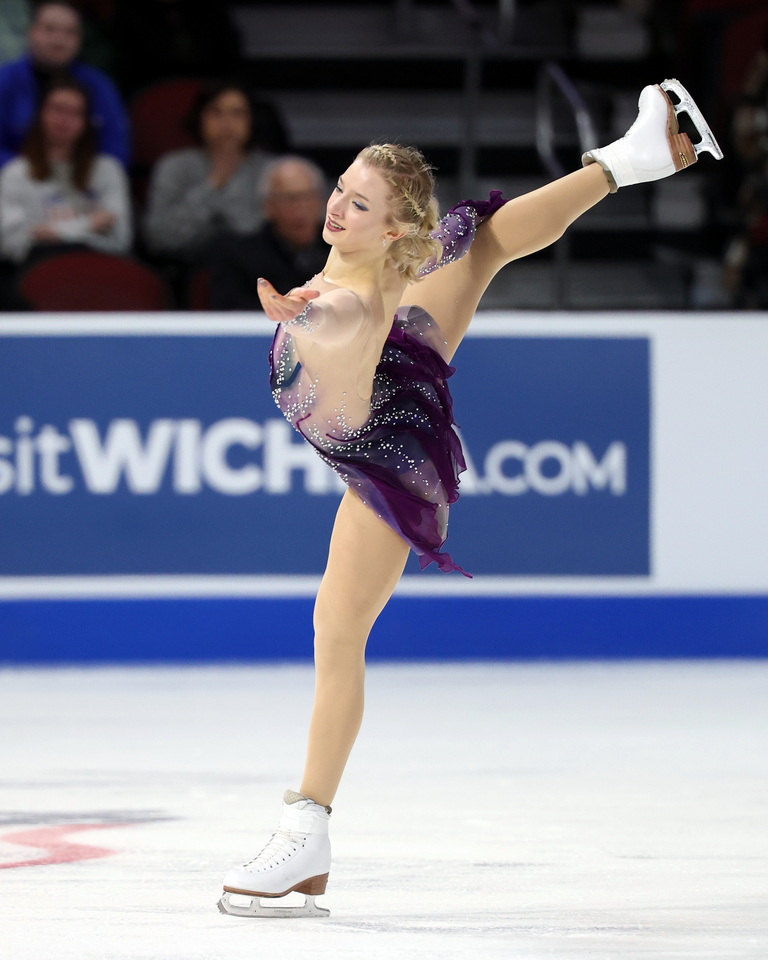
Amber Glenn, the 2024 U.S. titlist
and 2024-2025 ISU Grand Prix Final champion, triumphantly skated
away with top honors in the U.S. Championship women’s free
skate, claiming her second consecutive U.S. title in golden
style.
Earning the highest marks of the event, a
145.88 for a 216.79, Glenn’s program to ‘I Will Find You’ by
AudioMachine and ‘The Return’ by Clann was stellar, with its
main highlight being her signature showstopping move, a huge
triple Axel.
Catapulting to first, from third in the
short, Glenn landed all but one of her jumps, and cleanly
executed her
spins, footwork and connecting steps with notable attack, power,
command and strength while at the same time expressing the
intrigue and emotion of the music in optimal fashion.
“Today I tried to attack everything I
could,” said Glenn, who trains with Damon Allen and Tammy
Gambill in Colorado Springs. “I’m very proud of my mental
fortitude and the progress I’ve made and I hope to continue with
the consistency throughout the rest of the season.”
Alysa Liu, the 2019 and 2020 U.S. champion
who had catapulted to first place in the short program among the
deep 18-entry field in exhilarating fashion the day prior to
make for a stunning comeback following a two-year academic
hiatus, clinched silver with a 138.97 free skate score to render
a 215.33 total.
In the final tally, Liu’s marks also put
her in close proximity of Glenn, as her total score was
approximately one and a half points short of that total score.
For Liu, however, it was all about getting
out there and skating.
“This just feels really crazy to me,” said
Liu, who trains with Philip DiGuglielmo and Massimo Scali in
Lakewood, California. “I didn’t really have any expectations for
myself placement wise, just program wise, so I felt really good
throughout this experience.”
Liu, who had only again taken up skating
last summer, emerged as a major comeback story of this
competition due to her flawless short program in the initial
round of this event and then her electric free skate to Donna
Summer’s ‘MacArthur Park’ which was as big a hit with the
audience as it was with the nine-member official panel.
In this edge-of-your-seat program, Liu
executed all of her triples with power, quickness and
confidence, all the while interpreting Summer’s celebrated 70s
disco anthem with infectious spirit, understanding and
enthusiasm.
Sarah Everhardt, the fourth-place finisher
at last year’s Nationals who is reputed to be one of the sport’s
most exciting up-and-coming stars, claimed the bronze medal with
her action-packed program to Stravinsky’s ‘Firebird.’
Earning a 136.64 and 207.36 total,
Everhardt executed high-powered triple jumps that were defined
by excellent height, air position and beautifully held landings
as well as high-voltage spins and other notable things.
“It’s amazing to be on the podium [with
Amber and Alysa] and to see that I’ve made it to this level,”
said Everhardt, who is from Haymarket, Virginia and trains with
with Tatiana Malinina and Roman Skorniakov in Reston, Virginia.
“It’s an amazing feeling.”
For all these talented and driven athletes,
the real victory was just as much about the power of the group
dynamic as it was about in terms of just doing their best,
something that was more than apparent when they were all seen
walking into the press conference together after the awards
ceremony chatting, smiling and having fun together.
“I’m just really grateful to be on a podium
with these two lovely ladies and I can’t wait to go to new
events with them,” said Glenn. “I was just so proud of this
group of women seeing the camaraderie backstage and seeing the
supportiveness.”
Another leader of this
elite group, Bradie
Tennell, the two-time U.S. champion from Cary,
Illinois who had placed second in the short, was fourth with a
free skate score of 128.71 and 199.94 total.
Skating to Puccini’s ‘Turandot’ and ‘Nessun
Dorma’ as performed respectively by Vanessa Mae and Jackie
Evancho, Tennell reeled off her signature textbook-like triple
jumps, spins and footwork in solid fashion, although she had
stepped out on a few of her jump landings.
Tennell trains with Benoit Richard and
Jeremy Allen in the New York metropolitan area.
Along with the memorable performances of
all the top contenders, it was ultimately the stellar skating
quality of the entire women’s field that emerged as the major
takeaway of this event as it reflected the renowned gold-star
standard of American figure skating in a clear manner, something
that all of those on hand at the InTrust Bank Arena appeared to
very much honor, uphold and appreciate.
Chock and Bates Take Resounding Lead in the Rhythm Dance
by Liz Leamy
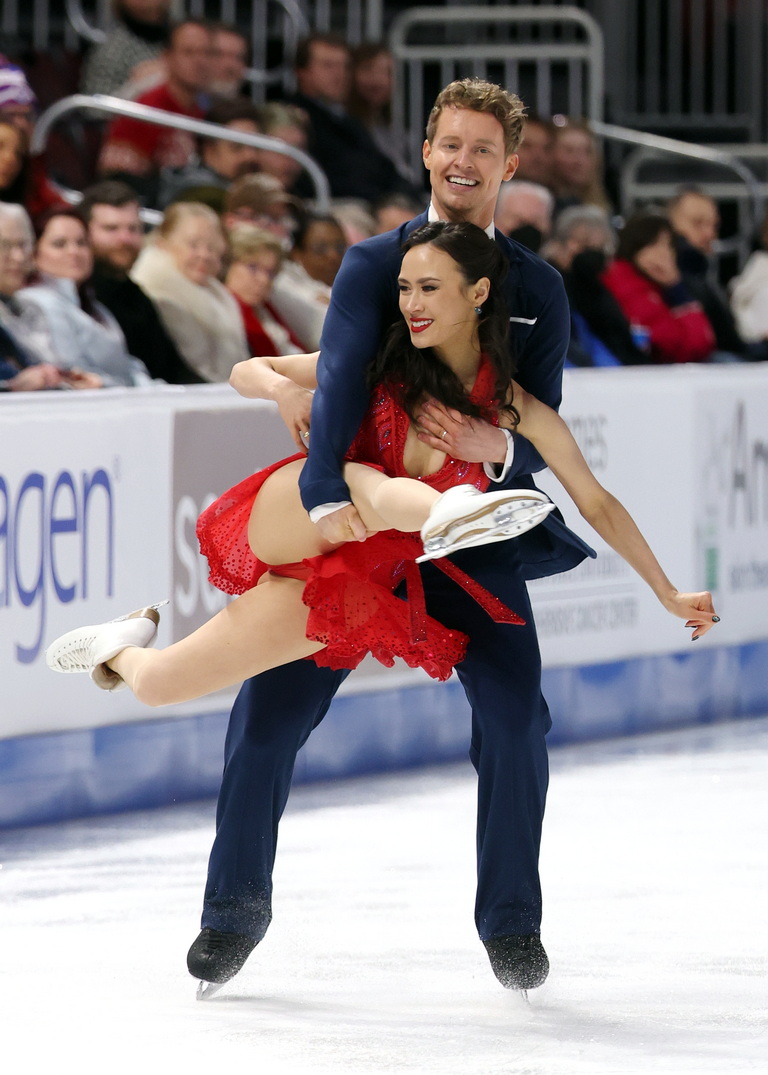
Madison Chock & Evan Bates, the 2023 and
2024 World Champions, 2022 Olympic team gold medalists and
five-time U.S. titlists, soared to first in the Championship
rhythm dance competition in triumphant fashion, taking a more
than a 10-point among the 15-entry roster with a 92.16 due to
their arresting rendition to a medley number-one American hits
dating from the 1950s through the 1970s.
Chock, who wore a stunning red dress and
Bates, who donned a grey suit with a white shirt and tie, once
again, showed up for the proverbial party, racking up big marks
for their mesmerizing horizontal cartwheel lift, terrific
twizzle sequence and smooth and easy step sequence, among other
notable things.
For this uber-accomplished American team,
regarded to be some of the most iconic skaters in modern-day
skating and who famously married in Hawaii last summer, it’s all
about continuously raising the bar.
“We’re really big on self improvement and
just trying to find every little iota of improvement that we can
find within ourselves,” said Bates in a media press conference
last August at the annual U.S. Figure Skating Champs Camp at the
Skating Club of Boston in Norwood. “We feel the programs are
fresh for us, which is something we really value a lot.”
Chock
& Bates train with Marie France-Dubrieul,
Patrice Lauzon and Romain Haguenauer in Montreal, where they
also reside.
Christina Carreira & Anthony Ponomarkenko,
the 2024 U.S. silver medalists and 2023 U.S. bronze medalists,
clinched second with their emotionally charged program to music
by Etta James and Little Richard, for which they were awarded an
82.86.
The duo, who train with Scott Moir, Madison
Hubbell and Adrian Diaz in Canada, wowed onlookers with their
stellar rotational lift, innovative choreographic rhythm
sequence, intricate midline step sequence, engaging Paso Doble
pattern step sequence and other outstanding elements.
“We feel pretty good about our skate
today,” said Carreira. “I felt kind of cautious about it, but
we’re still happy with the outcome and I think it was a good
performance.”
Ponomarkenko agreed.
“We trusted our training and trusted each
other and made it through,” said Ponomarenko. “We’re looking to
have a better skate overall in the free with confidence.”
Moreover, the duo covered the ice in
silk-like fashion, flowing over it with energy, quickness and
speed, while at the same time, demonstrating amazing body lean
and command of their skating.
For Carreira
& Ponomarenko, the goal in
this portion of the competition was to just do their best.
“This is a very complex program that is
very high energy, so we’ve worked on making sure we’re matching
our arms and refining the little moments that make the overall
program look very nice and clean,” said Ponomarenko.
Emilea Zingas
& Vadym Kolesnik, the 2023
U.S. National fourth-place finishers, claimed third with their
dynamic disco-infused short dance to a Bee Gees medley featuring
the iconic 70s hits, ‘Jive Talkin,’ ‘Staying Alive’ and ‘Night
Fever’ for which they earned generated an 82.13.
Donned in purple sequin, gold and black
costumes, the duo, who trains in Novi, Michigan, did such
notable elements as a lightning-like rotational lift,
high-powered midline step sequence and lively choreographic
sequence in which the crowd clapped in tandem with each one of
their steps and movements.
“I think we’re pretty happy with our
performance today,” said Zingas. “This season has been a season
of growth and a lot of learning for us again so we’re happy to
be here and worked really hard in the time that we had since our
last competition. I think that showed, as well as how much we
enjoyed this program and this dance style.”
Kolesnik concurred.
“I enjoyed every second of it, the crowd
was crazy, we went crazy and I was happy with everything,” said
Kolesnik.
The team, who only have been skating
together since 2022, are coached by Igor Shpilband, Natalia
Deller, Adrienne Lenda and Pasquale Camerlengo.
In this event, Zingas
& Kolesnik tied in total segment points with Caroline Green & Michael Parsons, who also had scored
an 82.13, eeking out third by roughly two-tenths
of a point tiebreaker based on the technical element scores.
Alysa Liu Soars to Top of Leaderboard in Women’s Short
Program With Stellar Comeback Performance
by Liz Leamy
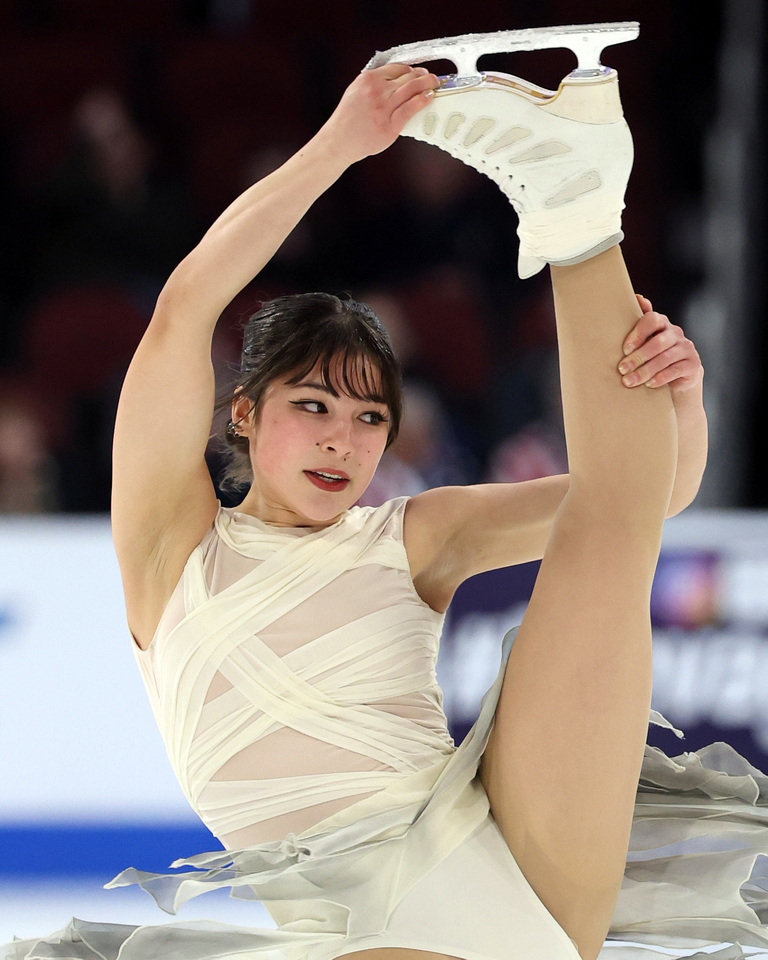
Alysa Liu, the 2019 and 2020 U.S. champion,
made an indelible mark in the women’s short program competition
at the U.S. Championships Thursday night, earning the highest
marks, a 76.36, among the field of 18 entries, to in turn position herself for a third consecutive
National senior title.
Liu’s electric performance to the stirring
piece, ‘Promise’ by Laufey and Dan Wilson, was lyrical, high
energy and compelling and featured such notable highlights as a
triple flip-triple toe, triple Lutz, double Axel, high-velocity
spins and fluid footwork defined by big curves and body
movements.
At the conclusion of this performance, Liu
received a loud standing ovation from the crowd, something that
was especially poignant considering she has been absent from the
competitive circuit since 2022 upon having decided to attend
college full time at the University of California in Los Angeles
at that point.
“I was really excited to present my short
program on this big stage,” said Liu, who also lives in
Richmond, California and trains with Philip DiGuglielmo and
Massimo Scali in Lakewood. “Nationals is such a big competition
and I was just anticipating doing my best short program here. I
was emotional from the very beginning to the end and I really
loved that and I felt very connected to the ice.”
Bradie Tennell, the 2021 and 2018 U.S.
champion from Cary, Illinois, scored the second-biggest marks of
this competition, a 71.23, for her dramatic presentation of
Ronan Hardiman’s ‘Cry of the Celts’ and ‘Lord of the Dance’
which also had a big effect upon the high-energy Wichita crowd,
who gave her a loud ovation upon its conclusion.
In her characteristic style, Tennell reeled
off her elements with terrific ease, power and tenacity, with
highlights being a lightning-quick triple Lutz-triple toe,
triple loop, double Axel, high-velocity spins and fluid
footwork, among other things.
“It was really exciting for me to do this
program because it’s come along way since the beginning of the
season and I have such joy when I perform it,” said Tennell, who
is coached by Benoit Richard and Jeremy Allen in the New York
City metropolitan area. “It’s a very energetic and fun program
and it’s different from the things I’ve done before, so it’s
very fun for me to skate and especially in front of a crowd, so
I was excited to give a good performance tonight.”
Tennell was also happy about the prospect
of being back competing at this celebrated event after having
missed it last year due to an ankle injury.
“I was very excited to skate here again
after missing last year,” said Tennell. “I was just kind of
feeling a lot of emotions today because last January, January 26th
of last year, was my second surgery for my ankle, so it’s not
even been a full year yet and it’s just a little surreal to be
back at Nationals and skating.”
Citing last year’s situation as an example
of life’s many different, but ultimately tool-building
experiences, Tennell has once again, valiantly positioned
herself as one of the sport’s veritable leaders and is in close
range of capturing another U.S. title at this event, which is
exciting.
“I think every year, we all kind of evolve,
change and grow as people,” said Tennell, when asked about being
back in medal and title contention at Nationals in tandem with
Liu by a reporter at the post-competition press conference.
“We’ve both grown in different ways but I would say we’re both
competitors and have a very healthy respect for each other and
what we do and we’re both here because we love it.”
Tennell also elaborated on the importance
of the love of skating and how, for her, it serves as a base
power source in both the sport and in her life.
“I think we both connect on that aspect of
the joy of skating,” said Tennell, upon being asked about her
journey in the sport in relation to Liu at the post-event media
conference. “That’s what makes competition fun, right?”
Amber Glenn, the reigning U.S. titlist and
2024-2025 ISU Grand Prix Final champion from Plano, Texas was
third in the standings for her riveting interpretation of Janet
Jackson’s ‘This Time,’ for which she was earned a score of
70.91.
Another major favorite with the
Wichita crowd, Glenn flew around the ice with the speed,
presence and strength of a premier world contender, knocking
such stellar elements as a soaring triple flip-double toe,
electric triple loop, high-octane spins and a fast, intricate
footwork sequence, among other notable things.
Although she stood up her signature thrilling
triple Axel, it was two footed with a q call, however, which did
an effect on her technical score.
Still, Glenn’s program was exceptional as
she told members of the media at the post-event press conference
that she is looking forward to skating full out in the pending
free skate event.
“I did not feel the attack or adrenaline going out there today,”
said Glenn, who trains in Colorado Springs with Damon Allen and
Tammy Gambill. “I do feel like I will be able to give that
attack tomorrow in the free skate and not hold back as much as I
did today. I want to try and go full out.”
Ellie Kam and Danny O’Shea Dominate Pairs Short Competition
by Liz Leamy
Kicking off this year’s U.S. Nationals in
commanding style, Ellie Kam and Danny O’Shea, the reigning U.S.
champions, prevailed in the pairs short program skating to a
resounding lead with a 77.19 to catapult them to the top of the
12-entry leaderboard by nearly eight points.
Skating to the stirring ‘Rain in Your Black
Eyes’ by Ezio Bosso, the duo, who trains in Colorado Springs
with Drew Meekins, Bruno Marcotte and Sandy Straub, executed a
split triple twist, side-by-side triple Salchows, a throw triple
loop and stunning level four lift in which they covered the
entire rink length with ease, fluidity and mastery, among other
memorable things.
The team, who were 2024 ISU Grand Prix
finalists, also commanded the ice from the moment they took
their starting position all the way to the conclusion of their
performance and earned big applause from the lively Wichita
InTrust Bank Arena audience.
For Kam and O’Shea, it was a moment to
remember.
“We did a program we’re proud of today and
we were proud to go out there,” said O’Shea.
His partner agreed.
“I think we’ve made our skating more
focused and narrowing down our thoughts in our production, we’re
more together so that we just become more one instead of just
Ellie and Danny,” said Kam.
Emily Chan and Spencer Howe, the 2023 U.S.
silver medalists who train with Alexei Letov in Boston, earned
the second-highest marks of the competition, a 69.10, for their
breathtaking performance to Ed Sheeran’s ‘Give Me Love.’
Flying around the ice with the stealth and
speed of world-class contenders, Chan and Howe earned big marks
from the nine-member judging panel for their split triple twist,
throw triple flip, amazing level four lift and intriguing death
spiral, as well as other elements.
For the duo, it just was all about doing
their job.
“We’re really happy with our training and
wanted to give everything that we had out there,” said Chan. “We
felt that in terms of energy there were some things we could
definitely do better but overall, we’re really happy with our
presentation today.”
Alisa Efimova and Misha Mitrofanov, the
2024 U.S. silver medalists, racked up the third-best scores of
this competition, a 69.03, for their electric performance to ‘Ameska’
and ‘Uccen’ by the
Taalbi Brothers, putting them just seventh-tenths of a point
behind Chan and Howe, to set an exciting stage up for the free
skate showdown.
Although they had a slight misstep on their
side-by-side triple toes, this dynamic team scored stellar marks
for their split triple twist, throw triple loop, level four
lift, step sequence and combination spins, along with other
things.
According to Efimova and Mitrofanov, who
train in Boston with Olga Ganicheva and Alexei Letov, they were
happy with their performance.
“Overall we’re really happy with our
presentation today,” said Mitrofanov. “We were really working on
our emotions, not just in terms of technical and we were able to
go out there and show that.”
Von Felton Makes a Bit of History While Winning Junior Women Gold
by Lynn Rutherford
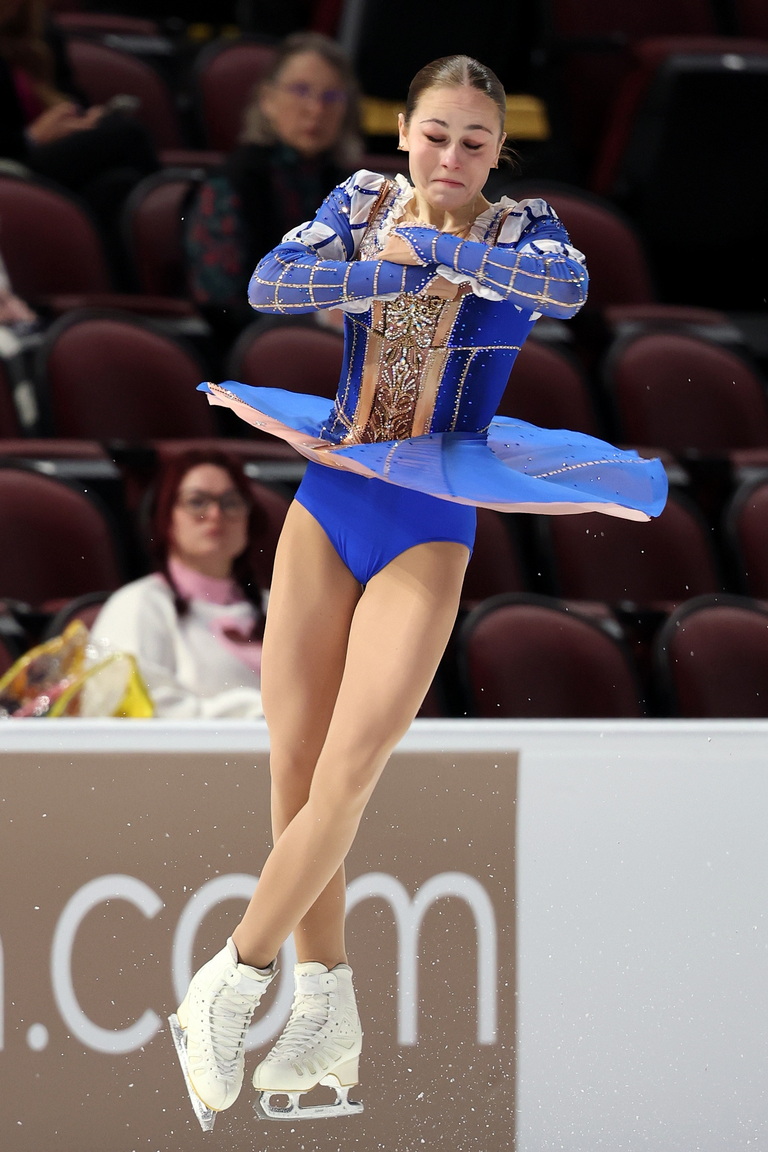
Mired in seventh place after falling on her
triple axel, triple toe loop combination in Wednesday’s short
program, Sophie Joline von Felton had little to lose in her free
skate. She would go for all of it: a quadruple salchow, and two
triple axels.
“I love making history,” the 16-year-old,
who trains at Skating Club of Boston, said.
Some three-and-a-half minutes later, she
had done just that, becoming the first U.S. woman to land a quad
salchow in competition.
“I feel amazing, because I trained hard for
it,” she said. “I skated (the program) with the axels, and
without axels, many times. At first, it didn’t work out. Then,
it got better and better. I started skating clean programs. I’m
so happy my hard work paid off.”
Stepping on to the ice as the final skater
in the penultimate group, Von Felton trailed short program
leader Skylar Lautowa-Peguero by nearly seven points. She made
up ground with the first three elements in her Romeo & Juliet
free: a triple axel, quad salchow and triple axel, double toe
loop combination.
The opening salvo added some 30.08 points to her
score, including three bonus points, and she went on to land
five other triples, including a triple flip, triple toe loop
combination in the program’s second half. She won the free skate
with 131.82 and amassed a total score of 188.84 points, just
0.84 more than Lautowa-Peguero.
The technical panel added a “q” to the
quad, meaning they thought it might be exactly a quarter-turn
short. A “q,” though, does not lessen the jump’s 9.70 base
value.
“No (U.S. woman) had ever landed a quad
salchow at nationals or ever,” Von Felton said. “It’s okay it
had a q, but the next time hopefully it works out clean.”
Under coaches Alexey Letov and Olga
Ganicheva, the Swiss-born skater has made history before. Last
year, she became the first woman to land a triple axel at the
U.S. Championships in the junior event.
Early this season, Von Felton was hampered
by inconsistency. She won gold at a Junior Grand Prix in
Slovenia, but as a last-minute addition to a second Junior Grand
Prix in China, she placed 13th. All this changed as
she prepared for Wichita.
“Actually, the last week (before the U.S.
Championships) I skated only clean programs,” she said. “So I
was a little shocked not to be able to do that in the short
here.”
Lautowa-Peguero, too, had a superb free
skate. Performing to “Inspiration” by Florian Christl, the
petite 12-year-old showed seven precise, clean triple jumps,
several done with both arms overhead, including a triple loop,
double axel, double axel sequence.
The youngster was one of the most
well-balanced skaters in the event, achieving Level 4 for all
three of her spins and impressing judges with her choreo
sequence. Her program component score of 53.59 led the field,
and she placed second in the free with 124.06 and second overall
with 188.
“I feel so good that I actually put two
programs together and they were strong,” Lautowa-Peguero said.
“I had a rocky season before this competition. I went through
some things that I never went throughbefore. (At one
competition) I popped three times in my long and stepped out of
my combo in the short. I was feeling down. The next competition
I got back up, but (next time) I did the same thing; I popped
three times in the long and stepped out of combo in short.”
Lautowa-Peguero,
who splits her training time between Hackensack, New Jersey and
Newburgh, New York, buckled down with coaches Larisa Selezneva
and Patch David, as well as mom Julia Lautowa, a six-time
Austrian champion, with an eye on making her mark in Wichita.
“I worked really
hard before this competition,” she said. “I started doing a lot
more run-throughs, and I felt better about myself. All of my
hard work paid off – I skated two clean programs at nationals,
and I feel excited to keep going and have more opportunities in
the future.”
Jessica Jurka,
fifth after the short program, performed a charming, creative
free skate choreographed by Stephanie Chace Bass to “Three Card
Switch” from the Good Omens album by David Arnold. With
seven triple jumps, including three in combination, it scored
176.23 points and lifted her to third place and the bronze medal
with 117.74 total.
“I’ve had a lot
of ups and downs this season, and I’d definitely have to say
that this is an up program for me,” Jurka said. “I gave all I
could today.”
The 15-year-old, who trains with
Stephanie Kuban in Colorado Springs, Colorado, paid special
attention to the details: refined hand and arm movements,
positions in spins and a high split jump. Her triples were high,
and she held her landings.
“That’s one of the things I like most about my skating,” she said.
“My jumps are flowy and soft. It’s not an athletic type of
program, but more like beauty and grace in it. I worked very
hard to get it like that.”
Born in Lima, Peru, Jurka is a 2023 recipient of the Mabel
Fairbanks Skatingly Yours Fund Promising Award of $10,000. She
is an ambassador for young skaters in Ecuador, where she has
taught youngsters the value of working hard to achieve your
goals.
Emilia Nemirovsky, second after the short,
claimed the pewter medal with 175.30 points. Her free skate,
choreographed by Zuzanna Parchem to selections by Eternal
Eclipse and Nicholas Britell earned 112.41 points and included
four triple jumps and two Level 4 spins.
“I think it was OK,” the Detroit-based
skater said. “I kind of lost in the second half but I was
determined, so that’s all that matters.”
Like Jurka, Nemirovsky’s jumps were high,
effortless and softly landed. The 15-year-old attributes this
not only to skating coaches Julie Berlin, Parchem and Garrett
Lucash, but to Ken Kashubara, head coach of the Sport Heaven
Track Club.
“When I was younger, I did track and
gymnastics, so I built a lot of muscle,” said Nemirovsky, whose
favorite track events are the 100 meter and 200-meter sprints.
“I think that definitely helped to get the power in the jumps I
landed today.”
Junior Man Lorenzo Elano Wins First U.S. Medal, and It's Gold
by Lynn Rutherford
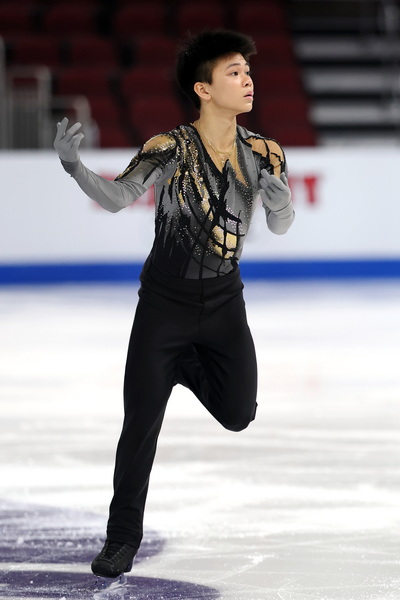
Consistency won the day for Lorenzo Elano, who placed
second in both the short program and free skate to earn
202.65 points and win the junior men’s crown in Wichita,
Kansas on Wednesday.
“It wasn’t my best performance, I’ve done way better in
practice,” an ebullient Elano said after his free skate, set
to a Philip Glass medley including “Mad Rush” and “The
Hours.”
“Honestly, coming off of the ice, I
wasn’t sure about how my score was going to be,” he added.
“I’m really happy with my first national medal.”
The 17-year-old from Chicago arrived at
the U.S. Championships a bit under the radar, never having
competed at a Junior Grand Prix. He did win a silver medal
at a junior “B” event in Nice, France in October – his
first-ever international event -- followed by gold at the
Midwestern Sectionals in November.
Elano’s confidence was momentarily shaken when, after
opening with a strong triple lutz, triple toe loop
combination, he fell on his second jump, a triple flip. He
recovered with a triple loop and second triple lutz
combination in the program’s second half, and gained the
event’s highest PCS marks, 69.45.
“I’m glad I kept going, because I had a
pretty rough start,” he said. “I kept doing what I do best.
I’m really glad that I didn’t leave as many points as I
could have on the table.”
The skater partly credits his music with
helping him overcome the miscue. Glass, the influential
minimalist composer and pianist, was also a favorite of 2022
Olympic champion Nathan Chen, who performed his free skate
to a Glass medley during the 2020-2021 season.
“My coaches (Jeremy Allen and Denise Myers) brought it up
to me, and Tommy Steenberg choreographed it,” he said. “I
felt like I connected with it really well. It helped me get
through some of the rough spots in the program.”
Third after the short, Aleksandr Fegan won the free skate
and the silver medal with a speedy and near-clean rendition
of Igor Stravinsky’s “Firebird,” highlighted by some fine
spins. He notched 131.35 in the free and 201.64 overall.
“I thought it was pretty decent,” the 15-year-old from
Little Falls, New Jersey, who trains in Hackensack under
Roman Serov, said.
“I was pretty happy with myself, because
five minutes before I went on the ice, my leg started to
hurt really bad, and I wasn’t sure I could compete. And I’m
just happy I was able to skate as well as I did today.”
Fegan, also the 2024 U.S. junior bronze
medalist, is only the latest in a long list of U.S.
medalists who have chosen to perform to music from the
Russian ballet.
“I thought it fit me well, so I decided
to test my abilities on it,” he said.
The fast-paced selection served to highlight Fegan’s
spinning ability, among the best of the event.
“I’m always (working on) spinning,” he
said. “For me, I like spins, and I like to focus on getting
Level 4’s and having them well executed.”
Patrick Blackwell, who led by more than six points after
Tuesday’s short program, fell four times in the free,
including a tumble on his opening quad toe. Still, the
Boston-based skater landed two triple axels and maintained
his vigor throughout his performance to Gabriel Saban’s
“Smoke and Mirrors,” choreographed by Adam Blake. It gave
him the bronze medal with 195.77 points.
“I chose (this music) because I like to
categorize myself as a very enthusiastic, open,
super-aggressive person, energy-wise,” he said. “I wanted
something very energetic to show that, rather than polish.
While I'm working on adding polish, energy is my strong suit
right now.”
His 118.04-point free skate here did not
approach Blackwell’s personal best at the Czech Junior Grand
Prix early this season, where he landed his quad toe and
gained 152.14 points. Several injuries, including a recent
broken thumb, impacted his preparation for the U.S.
Championships.
“I think I had higher expectations of
myself, just because of how I came away from my Junior Grand
Prix,” he said. “Pressure wise, I think (the pressure at
nationals) is about the same. Mainly for me, I had (put)
more pressure on myself …. But the main takeaway was the
experience of doing my first nationals, ever. I still find
it a valuable lesson, even though I had my struggles.”
Fifth after the short, New Jersey skater Kirk Haugeto
skated a creative and ambitious program set to music from
the 1981 Christopher Bruce ballet “Ghost Dances” that gained
third place in the free skate with 121.86 points. His 184.29
total earned him the pewter medal.
The evocative selections, most famously performed by ice
dancers Isabelle Duchesnay and Paul Duchesnay in the early
1990’s, inspired the young skater.
“I love the ballet, it’s a very good
story,” the 15-year-old said. “The story is like you’re
coming back, and no matter what people drive you to -- no
matter how far people put you down -- you can rise up and
show greatness.”
Haugeto attempted a triple axel early in his program but
fell. He did it, and the other six triple jumps in program,
with both arms overhead, ala 2016 U.S. champion Adam Rippon.
“I do all of my jumps that way,” he said.
“I kind of like it. It’s fun.”
Skylar Lautowa-Peguero Takes Junior Women Short Program
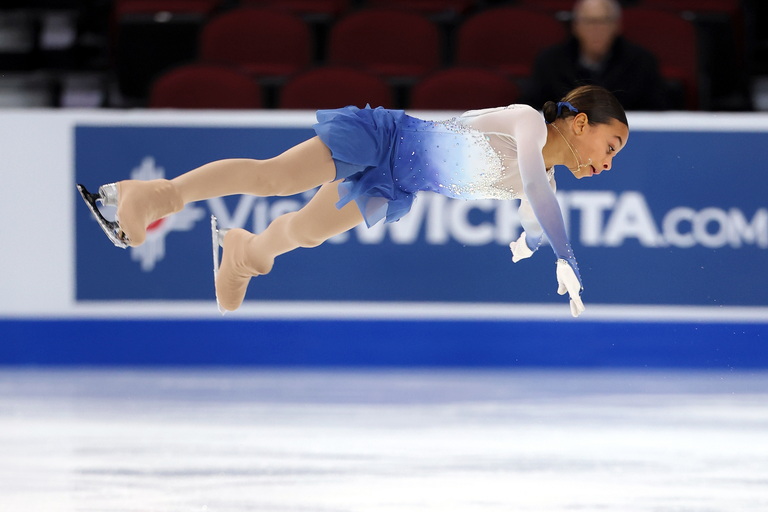
Patrick Blackwell First in Junior Men's Short Program
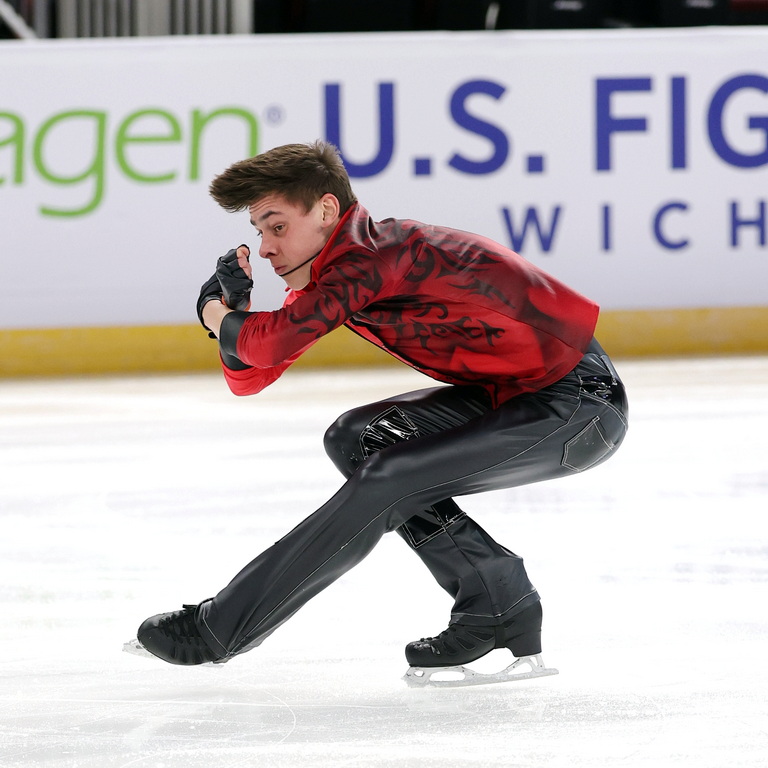
Reagan Moss & Jakub Galbavy Lead in Junior Pairs Short
Program

Ilia Malinin Looking to Make Another
Lasting Mark in Wichita
by Liz Leamy
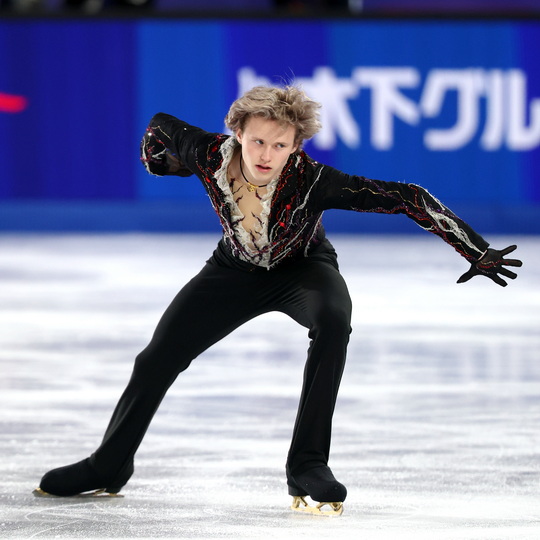
(19 January 2025) Ilia Malinin, the illustrious 2024 World
champion and 2023 and 2024 U.S. gold medalist, is geared up and
ready to make another lasting mark in Wichita at the
U.S. Championships that will be held at the InTrust Bank Arena
January 20th-26th.
The 20 year-old skating sensation, who
lives in Vienna, Virginia and trains in nearby Reston, Virginia
with his parents, Tatiana Malinina and Roman Skorniakov, both of
who were Olympic and World singles contenders in the 1990s, as
well as Raphael Arutyunyan is amped to continue his remarkable
skating journey at this celebrated annual sports event next
week.
Malinin, who, last December, captured his
second consecutive ISU Grand Prix Final title in Grenoble,
France after having claimed the same coveted finish in 2023, has
been on a golden mission in regard to building his skills and
artistry at an astonishing level, having famously executed all
seven quads, at this most recent celebrated global event.
“I’m trying to create this whole new
entertainment for people watching the sport. I think that’s one
of my main things,” said Malinin in a pre-Nationals media
teleconference. “It’s emotional to me just knowing that [several
years] back, I was technically just a jumper, but now I feel
like a lot of people, more and more, are starting to appreciate
what I can bring in terms of artistry and creativity. I think
that all the work that I put in for all those years is what I’m
just proud of.”
This season, Malinin has earned big props
all around in noting the high scores he has racked up for
artistry as well as for his renowned technicality in
competitions this season so far, with him skating to ‘Running’
by NF for his short program and ‘I’m Not a Vampire’ by Falling
in Reverse for his long program, both which are pieces designed
by Shae Lynn Bourne, the 2003 Canadian World dance champion with
Victor Kraatz.
“It was a really fun time this year,
especially just having both pieces of music which are different
from what I’d usually pick,” said Malinin.
Meanwhile, Malinin described his short
program music as something very meaningful to him.
“It was the song I’ve been listening to for
over three years now on repeat, so it’s just something that I
wanted to try and fit my own emotions into the piece,” said
Malinin.
Malinin then went on to say how his free
program is something he feels as very interesting and was also
one that he very much enjoyed learning in tandem with Bourne.
“She’s one of the best, so she was able to
put a really good long program together,” said Malinin. “I think
it’s one of my favorite long programs I’ve ever done with her.
I’m able to put all my emotions into it and really just feel
like myself when I’m doing that program.”
Malinin also elaborated about the beauty of
skating, likening it to an art.
“In my opinion, I think it is an art,” said
Malinin. “Everyone has their own way of viewing art and there’s
always different artists and people who have their own vision of
a ‘perfect’ image of a painting, and so everyone has their own
unique style of skating.”
As he gets ready to skate in Wichita next
week, Malinin also expressed excitement at the prospect of
competing in such an iconic American destination.
“I’m really excited to go to Wichita. I
hear that it’s the original place for Pizza Hut [too]. I’m
really looking forward to seeing that and I think it’s going to
be a fun time,” said Malinin. “It’s really fun to travel to all
the different places, see new states, meet new people and see
how much they enjoy figure skating.”
Amber Glenn Excited to Compete at
Nationals
by Liz Leamy
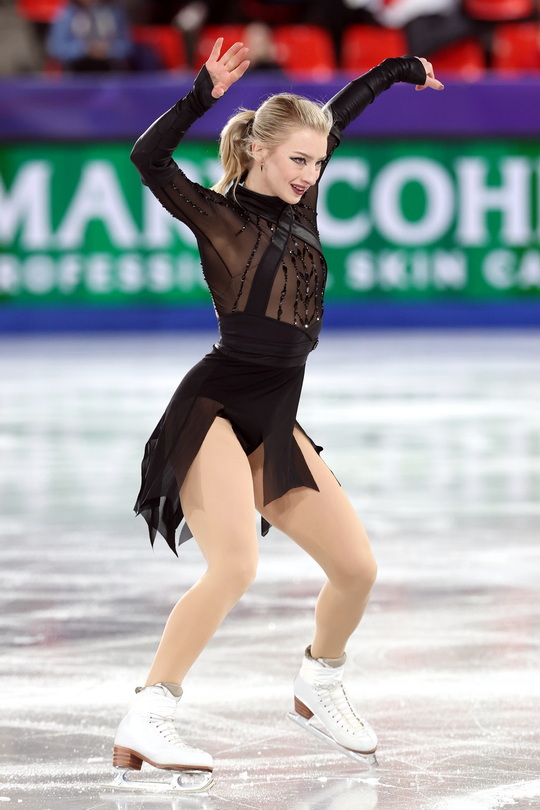
(19 January 2025) Amber Glenn, the reigning U.S. champion and
2024 ISU Grand Prix Final gold medalist who has been on a
remarkable trajectory in the domestic and global skating realm
over the past several years, is as amped as ever to compete at
the 2025 U.S. Championships in Wichita.
Citing this main annual event, regarded to
be one of the most highly anticipated showdowns of the sports
world every year, as one she is very much looking forward to,
Glenn seems optimally poised and prepared to indeed clinch a
second consecutive U.S. title, especially based on her results
this past season.
This past fall, Glenn, known for her
incredible energy and stunning jumping acumen (as she is one of
the only women in the world able to execute a clean and
rock-solid triple Axel) dominated the ISU Championship Grand
Prix circuit, scoring first at the Grand Prix de France and Cup
of China that were held in November prior to clinching the Grand
Prix Final crown in Grenoble, France last December in which she
outdistanced a formidable field of premier world skaters,
including Kaori Sakamoto, the three-time Japanese World champion
in 2022, 2023 and 2024 and 2022 Olympic bronze medalist.
Last January, Glenn, who grew up in Plano,
Texas and trains in Colorado Springs with Damon Allen and Tammy
Gambill, triumphantly claimed her first U.S. title in Columbus,
Ohio in valiant style, catapulting to the top of the formidable
American women’s field with technically loaded back-to-back
short and long programs, among other things.
Glenn, 25, who is also the 2021 U.S. silver
medalist and 2023 U.S. bronze medalist, is excited to continue
her exhilarating journey as she prepares to compete at the U.S.
Championships next week, which will be held January 20th
through the 26th at the INTRUST Bank Arena in downtown Wichita.
“I am feeling very excited. This is my
ninth senior U.S. Championships and I’m going as the top lady
which is a position I’m very fortunate to be in,” said Glenn in
a pre-Nationals media teleconference last week. “I want to have
a good time and see everyone.”
Glenn also expressed excitement at the
prospect of competing amongst a roster of so many exceptional
skaters, which also includes two other U.S. champions, Alysa
Liu, the 2019 and 2020 U.S. champion and Bradie Tennell, the
2018 and 2021 U.S. titlist as well as the many other talented
and accomplished contenders who will be there.
“These [skaters] have accomplished great
things and then we also have these newcomers who are doing
great,” said Glenn.
Glenn, who will skating to Janet Jackson’s
high-octane ‘This Time’ for her short and to Audiomachine’s
moving ‘I Will Find You’ and ‘The Return’ by Clann for her free
skate, also talked about her mindset this past season and how
she had garnered such great strength from her years of
experience leading up to this juncture in her life.
“As I came into my own, I really did some
reflection on who I am. Along with that came [the realization
of] deciding to skate and how I wanted to skate not for the
scores, but for myself,” said Glenn. “I would really say I came
into my own in the last couple of years and luckily I had a lot
of good resources and a lot of good tools. I asked for help, so
I was able to get here and I’m now doing what I never thought
I’d be doing.”
As Glenn continues her remarkable journey,
she expressed her gratitude in terms of being part of this event
to help further build exposure and excitement about the sport,
saying that when she first started, she had been very much
inspired when the U.S. Championships had been held near her home
in Dallas, Texas, in 2003.
“That’s when we started getting into
skating and it snowballed,” said Glenn. “I think the National
Championships could do the same thing in Wichita by having
people come out and experience figure skating.”
| 
